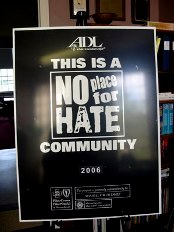Human Rights Commission Protest Vote Suspends No-Hate Campaign
HRC Seeks Sincere, Unequivocal Recognition from ADL of Armenian Genocide

This sign outside the Office of Human Diversity at City Hall designates Medford’s association with the Anti-Defamation League’s “No Place for Hate” campaign. The sign, along with others throughout the city, will be taken down as a result of the Human Right Commission’s vote to suspend participation in the program given the ADL’s position on the Armenian genocide. Photo courtesy Diane Mcleod.
– Allison Goldsberry
The Medford Human Rights Commission passed a resolution at their Wednesday night meeting to suspend the city’s participation in the Anti-Defamation League’s “No Place for Hate” campaign until the organization recognizes as genocide mass killings of Armenians by the Ottoman Empire during World War I.
HRC Chair David Harris said the ADL’s recent statement on the killings was “verbal acrobatics” and it did not sincerely and unequivocally recognize the killings as genocide.
The ADL’s statement stopped just short of characterizing the mass killings as genocide:
“We have never negated but have always described the painful events of 1915-1918 perpetrated by the Ottoman Empire against the Armenians as massacres and atrocities. On reflection, we have come to share the view…that the consequences of those actions were indeed tantamount to genocide,†wrote ADL National Director Abraham Foxman.
The ADL is hesitant to commit strong public support to the issue because of Israel’s relationship with Turkey, a key ally for the country in a tenuous Mideast.
Because the Commission feels the ADL’s stance contradicts the campaign’s mission, it voted to suspend Medford’s participation for six months, at which point it will withdraw completely if the organization does not change its position and continues to waffle on the issue.
“As commissioners, we appreciate the difficulty of living with a genocide and how much harder it is living with denial,” said Harris.
Several community members attended Wednesday night’s meeting to criticize the ADL’s position and urged the HRC to sever ties with the organization completely.
Elaine Hagopian said the ADL’s has “every right” to advocate for Israel and its protection, but its advocacy is conflicting with its mission of tolerance.
“If some of its means promote hatred they have no right to sponsor the ‘No Place for Hate’ campaign,” said Hagopian.
Tufts professor Bruce Boghosian said the ADL has been assisting Turkey for years with a massive campaign of denial.
“If the ADL truly wanted to recognize the reality of the Armenian genocide unequivocally they had time to do it by now,” said Boghosian.
The ADL has come under increasing criticism for their position and the issue is gaining more public attention.
According to Sevag Arzoumanian of the Armenian National Committee, Medford is one of six area communities to sever or suspend ties with the campaign recently, including Watertown, Arlington, Belmont, Newton, and Lexington.
Congress is currently considering a resolution that formally recognizes the genocide, and Congressman Ed Markey (D-Malden), recently expressed support of the measure.
“I believe that by passing this resolution, we will contribute to the process of rebuilding relations between Armenians and Turks and help heal the wounds from that dark period of history,†said Rep. Markey.
City Councilor Robert Penta brought up the issue at Tuesday night’s Council meeting and the Council supported forwarding his resolution to the Human Rights Commission.
Tonight’s decision of the HRC will eventually come back before the Council for a vote.
Medford joined the “No Place for Hate” campaign in 2004 after a Neo-Nazi group dropped hateful literature around the city.
According to Human Diversity Director Diane McLeod, though Medford does receive some funding from the campaign for programming, many of the city’s programs promoting tolerance and diversity would continue if the city chooses to completely sever ties with the ADL.
Police Chief Leo Sacco, a commission member, said if more communities withdraw from the campaign, which seems likely, it’s possible they will come together to fill the void and share best practices on anti-hate programs.
More…